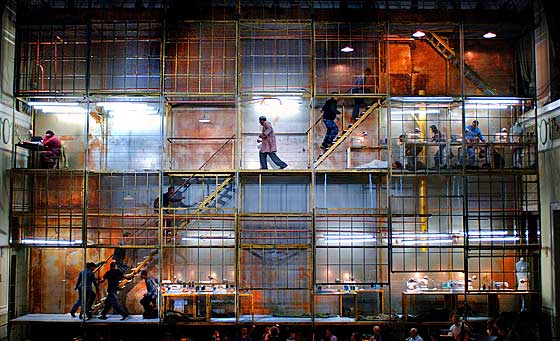
Peter Sellars has been having his way with Mozart’s operas for quite some time now, and the latest to get the full treatment is Zaide, at Lincoln Center for the Mostly Mozart Festival. More than a few apoplectic opera fans stormed out of the Rose Theater after sitting through Sellars’s jolting take, presented as an antislavery political tract set in a contemporary sweatshop. But there’s nothing new about that. Back in 1981, I remember, audiences had equally strong reactions to what was apparently the 23-year-old wunderkind’s first encounter with Mozart, a Don Giovanni staged in an abandoned movie house in Manchester, New Hampshire—a modest sneak preview of the production that would later develop into the infamous Spanish Harlem Don Giovanni, its seductive hero recast as a druggie who dines on Big Macs. Then there was a Sellars Così fan tutte set in a neon-lit roadside diner, The Marriage of Figaro relocated to Trump Tower, and The Magic Flute populated by a community of West Coast hippies searching for enlightenment.
Sorry—I loved them all, even when Sellars went over the top. His basic reaction to these pieces is always genuine, intense, theatrically alive, and, most of all, acutely aware of how Mozart’s special musical impulse shapes characters and dramatic situations with such immediacy. I won’t say that Zaide is the director’s most inspired effort, in part because the work itself, composed in 1779, is not in the same class as the four great operas of the composer’s maturity. For one thing, Mozart never quite finished the score—the original planned production came to naught and he quickly moved on to other projects. Not only was the finale uncomposed but all the spoken dialogue is missing as well, which leaves the whole plot in doubt and the outcome indecisive. (The title character is in love with a slave, then is captured by a jealous sultan, and she chooses the former over a lush life with the latter; the sultan grows angry and vengeful, but it’s not clear exactly what happens after that.) Any attempt to perform the piece—this one was coproduced by Lincoln Center, the Wiener Festwochen, Vienna, and the Barbican Centre, London—is bound to come off looking a bit scrappy.
Still, I enjoyed the performance, in part because Mozart’s response to these characters’ dilemmas inspired music of unusual richness and originality—even his more craftily contoured East-meets-West opera, The Abduction From the Seraglio, doesn’t dig into the material quite so deeply. The sorely beset slave Zaide herself covers an emotional range and diversity that is unique among Mozart heroines, a challenge that posed few problems for Hyunah Yu’s creamy, agile soprano. All the singers, in fact, were splendid, especially Norman Shankle’s bel canto turn as Zaide’s beloved and fellow slave Gomatz, while the Concerto Köln, a period-instrument orchestra, played the score immaculately under Louis Langrée’s alert musical direction. The harsh fluorescent glare of George Tsypin’s super-realistic three-tiered sweatshop told us very plainly that everyone on stage was trapped in a man-made hell. Sellars can’t convince me that Mozart really was a passionate anti-slavery activist, but he does have the uncanny ability of making even the most awkward opera singer look like a great actor.
Otherwise Mostly Mozart in general continues to thrive and flex its muscle at the age of 40. The festival runs through the rest of the month looking very comfortable and pleased with itself after undergoing a few rocky summers and fending off ominous threats of extinction. We are, of course, observing yet another big Mozart year (his 250th birthday), but MM is so confident about its mission that no special gimmicks have been deemed necessary to mark the occasion, just four weeks of imaginative programming that will render variations on an apparently inexhaustible theme. The opening-night concert was typical: two celebratory Mozart scores of weight and import, both nicknamed “Coronation”: the Piano Concerto in D, K. 537, which was played with grace and gravitas by Garrick Ohlsson, and the Mass in C, K. 317, sung by a starry solo quartet (Hei-Kyung Hong, Susanne Mentzer, Matthew Polenzani, and John Relyea) and presented in properly festive fashion by the music director, conductor Langrée. Sheer bliss.
Zaide
Directed by Peter Sellars. Mostly Mozart Festival. Avery Fisher Hall at Lincoln Center. August 9, 11, and 12.